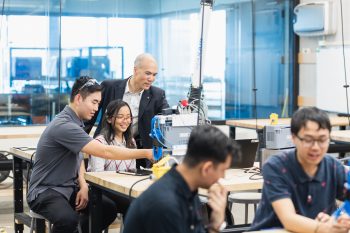Another technology commercialization success story emerges from U of T. Interface Biologics Inc (IBI), a company founded by Professor Paul Santerre, Director of the Institute of Biomaterials & Biomedical Engineering (IBBME), announced the successful conclusion of a licensing evaluation period with Fresenius Medical Care.
Fresenius Medical Care, the largest provider of dialysis products and services, will apply IBI’s Endexo technology to dialysis circuits for treating end-stage renal disease. Last week marked the conclusion of an evaluation period, at which time Fresenius Medical Care exercised its licence option, including the payment of a $2-million licensing fee. This payment represents an important step for the company as it transitions from research and development to a commercial-stage company.
Professor Santerre serves as IBI’s Director on its Advisory Board, and is the company’s Chief Scientific Officer.
“The research that led to the founding of this company was incubated in my lab within the Faculty of Dentistry from 2001 to 2004,” Professor Santerre said. His research into novel biomedical polymer technologies was identified by U of T’s Innovations and Partnerships Office (IPO) as viable for commercialization. IPO identified an investor, and in December 2001, IBI was created.
Although separate from U of T, start-up companies such as IBI not only demonstrate the innovative and creative thinking of its University researchers, but also turns their research into high-impact, life-changing products.
IBI’s Endexo is a self-locating fluoro-oligomeric additive that reduces platelet adhesion and activation, protein adsorption and thrombus formation in medical devices, thereby reducing the need for anti-coagulants, such as heparin. Endexo has significant manufacturing advantages over other anti-thrombogenic coating or impregnation alternatives and does not change the mechanical or functional properties of the underlying medical device.
IBBME’s unique interdisciplinary position between the Faculties of Engineering, Medicine and Dentistry makes it a particularly fruitful environment for the development of groundbreaking biomedical technologies such as this, remarked Professor Santerre. “IBBME researchers make use of the resources of facilities and expertise from all its Faculties and partners. The research that led to the founding of IBI, for example, involved chemical engineering and the health care expertise in Dentistry and Medicine. And I don’t have to look farther than our teaching hospitals and IBBME cross-appointed professors for consultants,” he said.
Along with taking advantage of such a community of expertise, he notes that IBI’s success comes as the result of a diversified portfolio. “IBI has always had at least three technologies in development, with short-and long-term goals,” he explained. “The investors stay engaged, and the risks we take remain measured.”
As investment grew from $1 million in 2001 to $10 million in 2004, Professor Santerre stepped back from his role of company President, but continues his leadership role as Chief Scientific Officer. In 2010, Professor Santerre received the Julia Levy Award from the Canadian Society for Chemical Industry for Commercialization of Innovation in Canada in the field of Bio-medical Science and Engineering. He continues to lead IBBME as its Director, where he fosters a community of excellence and where researchers develop the biomedical engineering technologies that change lives.



